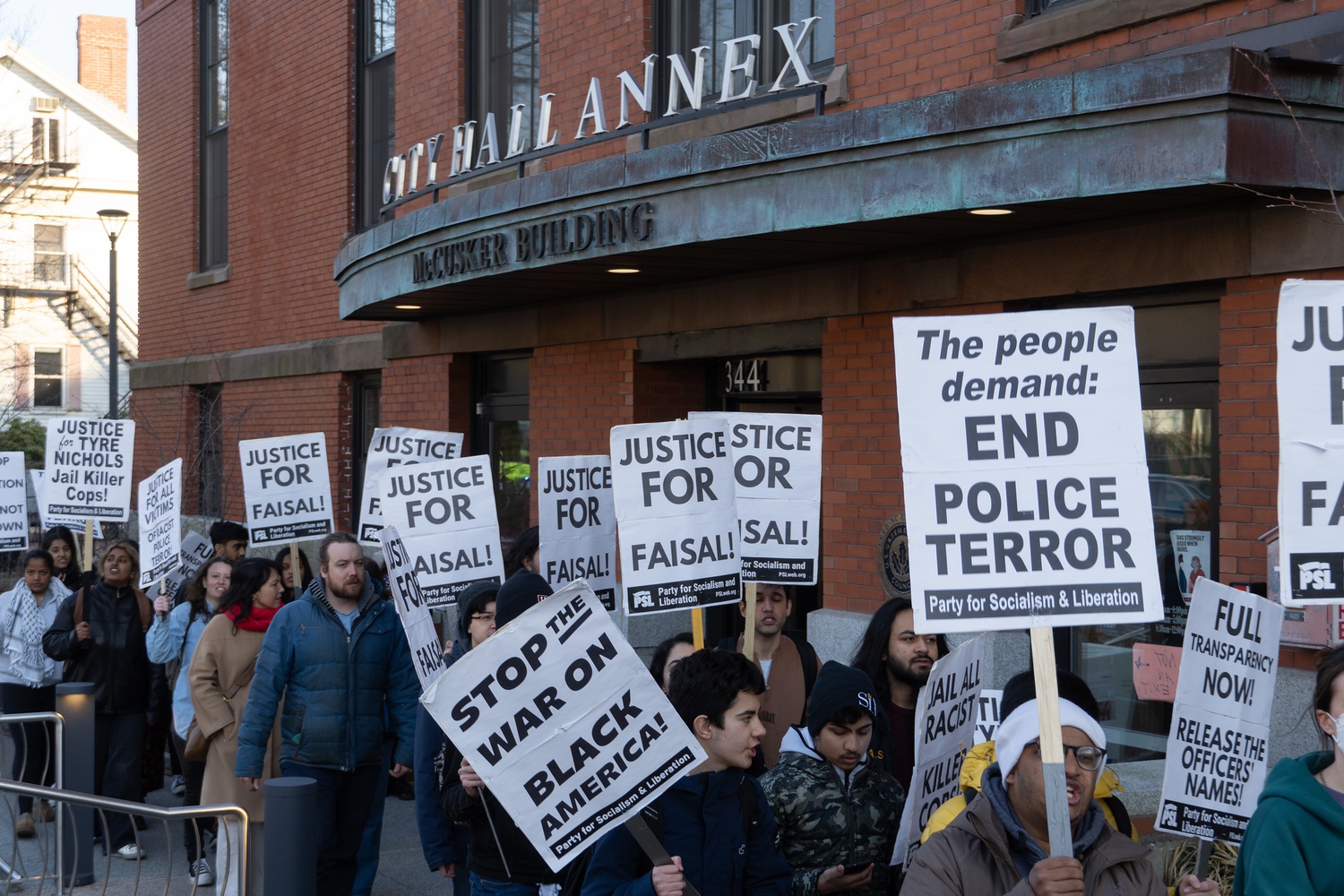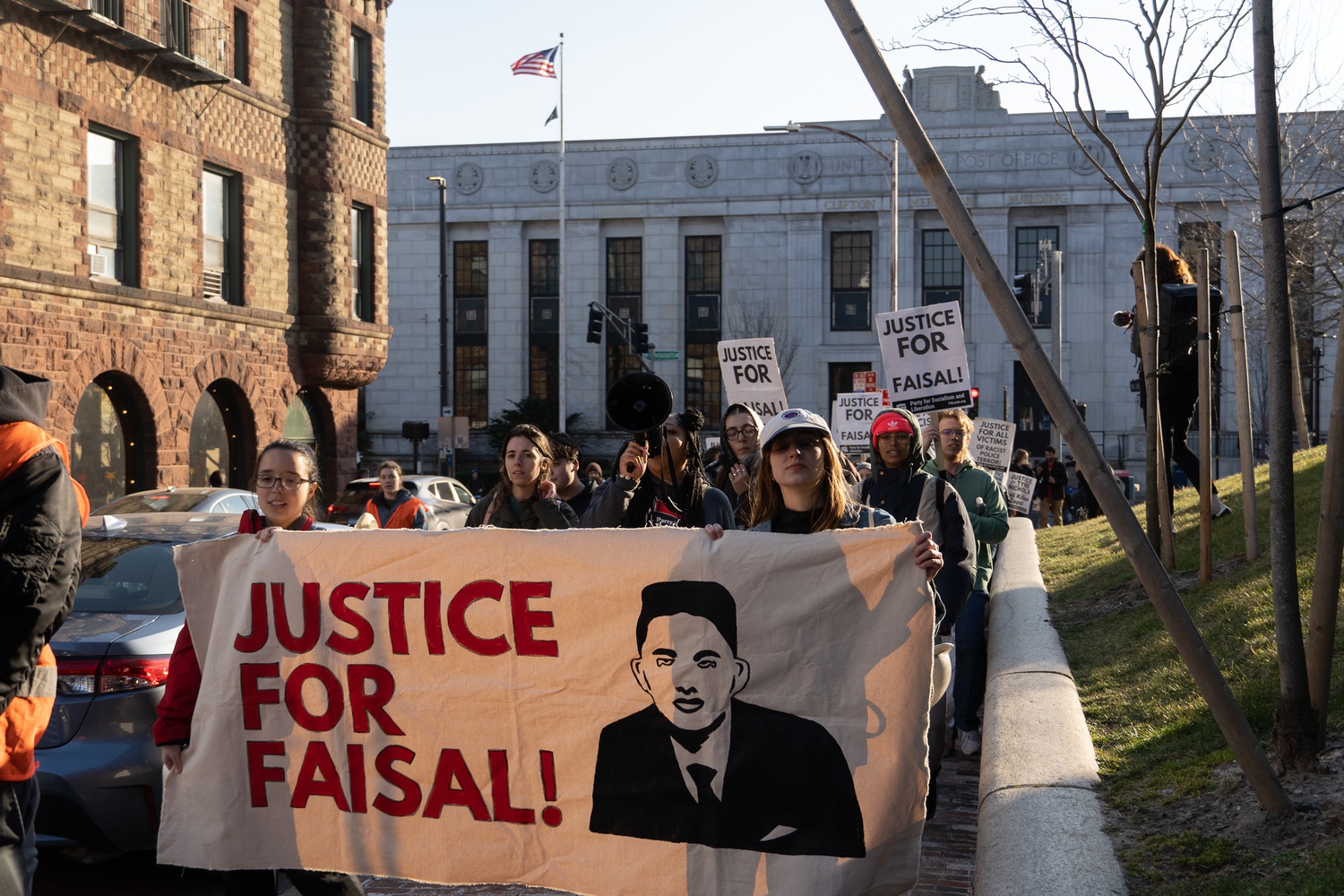
News
Summers Will Not Finish Semester of Teaching as Harvard Investigates Epstein Ties

News
Harvard College Students Report Favoring Divestment from Israel in HUA Survey

News
‘He Should Resign’: Harvard Undergrads Take Hard Line Against Summers Over Epstein Scandal

News
Harvard To Launch New Investigation Into Epstein’s Ties to Summers, Other University Affiliates

News
Harvard Students To Vote on Divestment From Israel in Inaugural HUA Election Survey
City Officials Meet with Activists Demanding ‘Justice for Faisal’ as Dozens Rally Outside

UPDATED: March 22, 2023, at 12:51 p.m.
As roughly 100 protesters rallied on the steps of the Cambridge City Hall Annex Tuesday, city leaders met with local activists after months of demonstrations over the police killing of Sayed Faisal.
Three representatives from the city of Cambridge — City Manager Yi-An Huang ’05, Interim Director of the Community Safety Department Elizabeth M. Speakman, and Director of Communications and Community Relations Lee Gianetti — sat down with four organizers from the Boston Party for Socialism and Liberation and 13 local students to discuss their concerns.
Faisal, a Bangladeshi American student at the University of Massachusetts Boston, was fatally shot by Cambridge Police on Jan. 4. According to CPD, Faisal approached officers wielding a knife following a five-block chase. When a non-lethal sponge round failed to stop him, an officer shot and killed him.
In the months since, protesters have alleged police brutality and racism in Cambridge’s police department and reiterated demands for the city to name, fire, and prosecute the officers involved, as well as release the full unredacted police report.
Little progress was made on these points, according to Party for Socialism and Liberation organizer Joe Tache, who participated in the meeting and called the talks “frustrating.”
“Unfortunately, the city wasn’t willing to make any movement on the demands right now,” Tache said.
City officials have maintained they will release the names of the officers involved and the police report only after the completion of an ongoing investigation by the Middlesex District Attorney.
In a statement Wednesday morning, Huang said the city and activists have a “shared urgency” on police reform, but added that he was disappointed in the Party for Socialism and Liberation’s approach to the meeting.
“I appreciate their passion and activism and the opportunity to have dialogue,” Huang wrote. “I’m disappointed that Boston PSL is only interested in firing police officers without process and was uninterested in conversation about the how to achieve the change we all desire.”
In an interview Tuesday morning, Huang said the city approached the meeting seeking a middle ground with the organizers.
“I have interest in a real conversation and a productive conversation,” he said. “A lot of the direction that they’re pushing in — for police reform, legitimacy, transparency, accountability — those are all things that we’re really committed to.”
“There’s a broader conversation about police reform,” Huang said. “Are the folks who are protesting interested in that or are they just interested in protesting?”

An hour before the meeting, protesters converged on the steps of City Hall to continue a rally that began the previous day. Speakers shared stories of personal encounters with police, led chants of “Justice for Faisal,” and demanded change from CPD and the city of Cambridge.
“One thing that the city manager told us is that he’s gotten advice to wait, and we’ll go away,” Tache told protesters, triggering a wave of boos.
At 5:22 p.m. the crowd of protesters marched to the City Hall Annex, where the meeting between organizers and city officials was taking place. Four CPD motorcycles accompanied them — to the jeers of protesters — and parked across the street at John M. Tobin Elementary School to observe the demonstration.
For nearly two hours, the demonstrators marched in a circle by the entrance of the City Hall Annex, waving signs, singing songs, and chanting “No justice! No peace! No racist police!” “Release the names,” and “This racist system’s got to fall.”
“Negotiations with organizers are going on right now as we speak,” said Meilyn C. Huq, an organizer with the Party for Socialism and Liberation and the demonstration’s emcee. “Let’s make some noise so the city manager can hear the energy in this crowd.”
Despite the lack of action, protesters saw the meeting as a validation of their continued organizing.
“The city manager would have never held a meeting with community organizers if it wasn’t for all the pressure that we have given them,” said Safiyyah Ogundipe, a MIT student who participated in the meeting with the city officials. “We should all be super proud of ourselves.”
Huang said in the interview Tuesday that he is accountable to residents of Cambridge despite his role as an unelected city manager — a feature of Cambridge’s Plan E form of government that activists have called undemocratic.
“I am more accountable in these kinds of circumstances,” he said. “If you look at my contract, ultimately, a majority of city councilors could terminate my contract at any time,” he added.

Tache told the crowd that the demonstrations had already impacted the state of policing in Cambridge, pointing to a series of policing reforms made in the months following Faisal’s death.
“Was Cambridge implementing these body cameras before these protests? Was Cambridge hiring PERF or other consultants about issues of policing before these protests?” Tache asked rallygoers. “These protests are the main reason that any reform is happening in this police department in the first place.”
Amari M. Butler ’25, who spoke at the rally, said that the Tuesday rally evoked “optimism.” Still, she said she wishes “to see more Harvard students engage in the struggle.”
“This happened not very far from Harvard’s campus. It happened in Cambridge,” Butler said. “I have not seen the amount of Harvard people show out as I feel should.”
“This is not the first rally we’ve had. It’s one of many, and it won’t be the last,” she added.
—Staff writer Ryan H. Doan-Nguyen can be reached at ryan.doannguyen@thecrimson.com. Follow him on Twitter @ryandoannguyen.
—Staff writer Yusuf S. Mian can be reached at yusuf.mian@thecrimson.com. Follow him on Twitter @yusuf_mian2.
Want to keep up with breaking news? Subscribe to our email newsletter.
